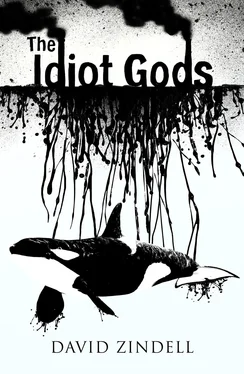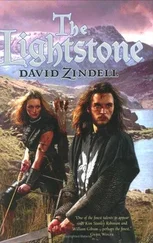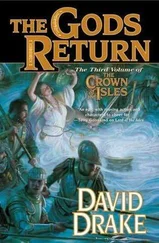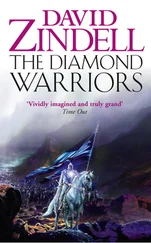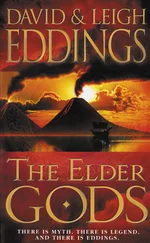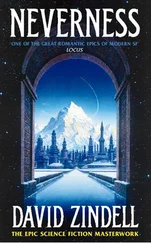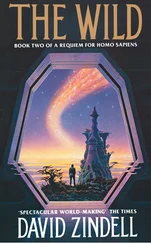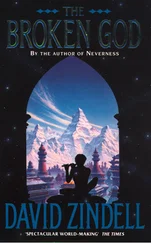‘Can you jump again for me?’ she said to me. From a plastic bucket full of dead, dirty fish, she removed a herring and tossed it into the water.
I swam over and nuzzled the herring. Although I was hungry, I did not want to eat this slimy bit of carrion.
‘Here, like this,’ she said.
She clamped her arms against her sides, then jumped up and kicked her feet in a clumsy mockery of a whale’s leap into the air.
‘If he’s as smart as they say he is, Gabi,’ one of the females standing near her said, ‘you’ll have him doing pirouettes in a month.’
‘Wow, look at the size of him!’ a male said. ‘They weren’t lying about how big he is.’
‘Yes, you are big, aren’t you, Bobo?’ the female said. ‘And in a few more months, you’re going to be our biggest star. Welcome to Sea Circus!’
My elation at being once again immersed in water vanished upon a quick exploration of my new environs. How tiny my pool of water was! I could swim across it in little more than a heartbeat. It seemed nearly as tight as a womb, though nothing about it nurtured or comforted. The pool’s walls seemed made of stone covered in blue paint. Whenever I loosed a zang of sonar to keep from colliding with one of the walls, the echoes bounced wildly from wall to wall and filled the pool with a maddening noise. I felt disoriented, abandoned, and lost within a few fathoms of filthy water. I could barely hear myself think.
I did not understand at first why the humans delayed in devouring me. Then, after half a day in the pool, I formed a hypothesis: the few humans I had seen could not possibly eat a whale such as I by themselves. Perhaps they waited for others of their kind to join the feast. Or perhaps they had captured and trapped me for a more sinister reason: here, within a pool so small that I had trouble turning around, they could cut pieces out of me over many days and thus consume me from skin to blubber to muscle to bone. It would take a long time for me to die, and the humans could fill their small mouths and bellies many times. Protected as the pool was by its hard, impenetrable walls, no sharks would arrive to steal me from the humans and finish me off. I would have nearly forever to complete the composition of my death song, which I had begun when trapped by netting in the bay.
I could not, however, sing. In such a place, who could give voice to the great mysteries and exaltations? In tainted water roiling with the cacophony of sonar crisscrossing the pool and fracturing into deafening zangs, who could prepare for the great journey into the quiet, eternal now-moment that underlies the beginning and end of time? No, no, I could not affirm life by opening myself to my inevitable death, and so I cried out in a rage at having come so far only to suffer such a despicable fate. I raged and raged as I cried out to my family who could not hear me, and I swam and I swam back and forth across the hated pool, back and forth, back and forth.
Such despair can derange the mind. Soon, I began hearing voices: the voices, I thought, of the other orcas trapped in other pools nearby. Surely the moans and murmurs of discontent that I heard must issue from real, living whales, mustn’t they? How, though, could I be sure that I was not hallucinating? In the distant lamentations that vibrated the walls about me and further poisoned the sounds of my pool, I could barely make out voices deformed by accents strong and strange:
‘Welcome, welcome, welcome!’
‘Go away, whale of the Northern Ocean! We do not want you here!’
‘Go away, if you can! But, of course, you cannot. You are trapped like a krill in the belly of a blue whale.’
‘You are trapped as we are trapped. Do not dispirit yourself by trying to keep alive your spirit.’
‘Do not listen to Unukalhai, for he is mad.’
‘Abandon all hope, you who have entered this place of hopelessness.’
‘Live, brave orca. It is all you can do!’
‘Die, strange one. Breathe water and die before your soul dies and you cannot die when it comes time to die.’
‘No, escape!’
‘Do not hope for escape. All who come here die.’
‘Quenge and escape before it is too late.’
‘Who can quenge in such a place? Die, die, die!’
‘Welcome, welcome, welcome!’
Soon, I met those orcas who had spoken to me and so confirmed their reality. My pool, as I discovered, joined with other pools, some much larger but still too small to move about comfortably. Between each pool, the humans had contrived doors which they somehow opened and shut as easily as I might my mouth. With the humans standing about the concrete beach of the largest of the pools, as the hot sun made the warm water even warmer, I made my way into the pool as tentatively as I might swim into a cave full of stingrays. There I mingled with the other orcas and made their acquaintance.
‘Hello, I am Alkurah,’ a large female said to me. Her speech rippled with curious inflections and had an odd though pleasant lilt to it. ‘And these are my sisters, Salm and Zavijah.’
Salm, younger and smaller than Alkurah, had a notch in her right flipper, and her dorsal fin flopped over upon her back in a most undignified way. So it was with quiet and moody Zavijah and her dorsal fin and with her baby, Navi. The whole family, I saw, suffered from the same horrifying affliction.
‘We are the last of the Moonsingers,’ Alkurah said, ‘of the Midnight Voyagers of the Emerald Sea. We were taken years ago and have been here at Hell Water ever since.’
‘Years ago!’ I cried out. ‘And the humans still have not eaten you?’
‘Eaten us?’ she said. She swam closer to take a look at me. ‘No, no, strange one – these humans are not whale eaters.’
At this revelation, I should have experienced relief at having been delivered from a dreadful death. Instead, I sensed the closing-in of a different sort of danger and felt the intimations of an even more horrible fate.
‘Then why,’ I asked, ‘have the humans brought us here?’
‘Why, to perform feats.’
‘What sort of feats?’
‘Breaching and leaping, spy-hopping and gyrations. They like to stand on our backs while we swim about the pool.’
‘They … stand on your back, truly?’
‘Oh, yes, they do – as they do, and make us do, many other things.’
‘But why?’ I asked.
‘We do not know. The humans are insane.’
‘Yes,’ I said. ‘But they must have reasons for what they do, insane though these reasons might be.’
‘Must they, really? The humans are not reasonable animals. Indeed, after many years of having to endure their ugly faces and their squawking day after day, I am convinced they are quite stupid.’
‘Perhaps their minds are so different from ours that they—’
‘You know little of humans, Strange One,’ Alkurah chided me. ‘Let us not speak of your speculations now. I was making introductions when you interrupted me.’
‘My apologies,’ I said. ‘I did not mean to be rude. Please continue.’
Alkurah introduced a smallish male named Menkalinan from the Star Far Vermillion Sea. It surprised me to learn that Menkalinan, sulky and streaked with scars, was Navi’s father.
‘I see that you can be politely quiet when spoken to by a mother orca,’ Alkurah said to me. ‘I like that, for it shows that you have been well raised. But I can hear the disquiet of doubt in your silence.’
In silence, I swam about the tepid water, and so spoke even louder.
‘You are wondering, I think,’ she said, ‘how my sister Zavijah could mate in such a place – and with such a pitiful male as Menkalinan, who can barely sing.’
‘Well, yes, I was wondering that very thing,’ I said. I studied Menkalinan’s flopped-over fin and the sad, furtive way that he propelled himself about the pool.
Читать дальше
